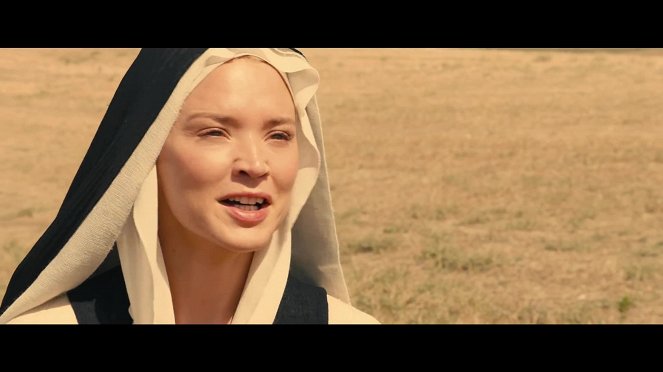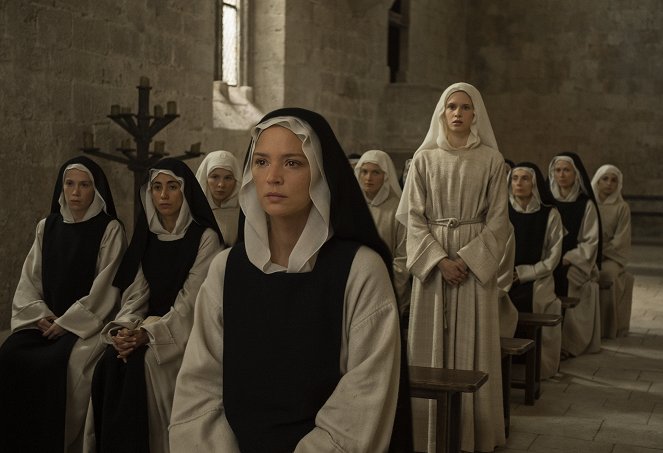Director:
Paul VerhoevenCámara:
Jeanne LapoirieMúsica:
Anne DudleyReparto:
Virginie Efira, Charlotte Rampling, Daphne Patakia, Lambert Wilson, Olivier Rabourdin, Clotilde Courau, Louise Chevillotte, Hervé Pierre, Alexia ChardardStreaming (1)
Sinopsis(1)
A finales del siglo XV, con una plaga asolando la tierra, Benedetta Carlini se une como novicia al convento de Pescia en la Toscana. Benedetta, que desde muy joven ha tenido la capacidad de realizar milagros, llega a la comunidad y su impacto será inmediato y trascendental. (Avalon Audiovisual Esp.)
Videos (9)
Reseñas (9)
De alguna manera siento que Paul Verhoeven, después de cumplir ochenta años, no tiene necesidad de complacer a nadie, así que hizo una nueva película principalmente para sí mismo y completamente a su gusto. El resultado no es arte y ensayo, sino más bien «nunsploitation» de grado B puro, donde el director vuelve a hacer gala de su gran sentido de la provocación y del humor negro. Sigo totalmente en sintonía con su onda, así que probablemente me comeré lo que me presente, pero por lo demás tengo claro que Benedetta no es definitivamente una película para todos. [KVIFF 2021]
()
Una película erótica sobre monjas, ambientada en un convento italiano del siglo XVII con el telón de fondo de una epidemia de peste. Se trata de un intento bastante desequilibrado de elevar la base del cine de clase B, cuya fuente es la tradición del cine de explotación italiano con monjas (nunsploitation), al nivel de los festivales de clase A. Paul Verhoeven plantó en ella sus marcas comerciales y sus obsesiones favoritas, incluyendo, por ejemplo, la ironía cáustica, el sadismo y la perversión, o el feminismo, en este caso aderezado con una crítica burlona a la Iglesia como institución hipócrita controlada por intereses de poder y que se interpone en el camino de la libertad sexual. Su protagonista, una joven monja que experimenta visiones muy vívidas de la revelación de Cristo y experimenta un despertar lésbico con una novicia recién llegada, es seguida desde la infancia en una serie de escapadas sacrílegas cuyos verdaderos orígenes, envueltos en el misterio (tal vez un verdadero milagro de Dios, tal vez sólo una obra de teatro con un objetivo interesado), impulsan toda la película. La mayor parte del tiempo, la película se divide entre una farsa de humor negro de baja estofa sobre el abuso de la credulidad de los fieles (con pedos, defecaciones y empalagosos temas pornográficos) y la figura de Jesucristo como protector, que decapita sin miedo a enemigos y bestias por igual), y un desgarrador drama serio con música seria y violencia naturalista sobre una mujer delirante empeñada en autolesionarse y los efectos negativos de la fe fanática. El choque de estos dos enfoques tonalmente contradictorios suena bastante problemático e insatisfactorio, pero puede que a Verhoeven no le importe, porque probablemente sólo quería divertirse y también provocar e indignar un poco, cosa que consiguió. Por todo ello, Benedetta también entra en la categoría de entretenimiento que roza el placer culpable, apta para proyecciones de medianoche en festivales que dividirá a los espectadores, y en la que en términos de interpretación brilla más Charlotte Rampling en el papel secundario (pero esencial y notable) de la escéptica madre superiora que la pareja de amantes.
()
Lesbian nunspoitation by Verhoeven set in a 17th century Tuscan monastery. Verhoeven has made an unconventional erotic religious drama that is not afraid of nudity and violence. The actress who plays Benedetta, Virginie Efira, looks very good at 45, and her full frontal nude will please many a male eye, but the rebellious Daphne Patakia looks good too – she is the hottest nun I have ever seen. The combination of sinful nuns and a corrupt Christian institution works surprisingly well. The historical period where Europe was gripped by the Plague, the very intense and exciting lesbian sex scenes, the Stigmata vignettes, the great nightmares of Benedetta (the snake scene or the brutal killing of the knights, surprised by the raw gore). I liked the harsh rules the nuns had to follow and the intense finale is solid, with a cool trial, torture and chaos of the townspeople. The pacing is slower in places, but the film managed to keep my attention thanks to the attractive interludes. Definitely a noteworthy affair.
()
In an effort to track down the truth about the life of the lesbian nun Benedetta Carlini, Verhoeven employs the formula of historical biography to analyse the Church’s model of power, in which faith is only one of the means of survival and maintaining dominance. Until the end, the film does not give a clear answer as to whether the protagonist really communicates with saints and possesses mystical abilities, or whether she is merely capable of exploiting the fears of others. Due to the impossibility of a rational explanation of some of the events depicted in the film, both interpretations remain possible. As in Total Recall , there is not a clearly defined line between reality and illusions or dreams. In any case, the Dutch filmmaker approaches belief in the supernatural with cynical humour and a sense of the grotesque, both of which are apparent in the arrangement of the mise-en-scene, working with the aesthetics of contradiction and ambiguity, and in the composition of the shots. As a complex, ambivalent female character, Benedetta alternately elicits sympathy and repulsion. Though she promises her followers protection from the plague that is decimating the Italian population, she mainly pursues her own gratification. Salvation and redemption are only illusions. Unlike the unquestioningly listening, frightened and thus easily manipulated crowd, we see that it is not Jesus but rather the closed city gates that provide protection against the disease. No divine forces, just a lockdown. Besides her intelligence and charisma, what makes her a credible religious figure are the stigmata that she inflicts on herself with a shard of glass. Consequently, she can determine what God’s will is and cheerfully abuse the fact that each of the nuns interprets the language of God in her own way. For Verhoeven, religion is not a matter of inner conviction, but rather a culturally, geographically and historically defined phenomenon that serves momentary biological needs and the interests of power. Anything can be justified by God. A similar approach to the clergy is taken by other representatives of the Church, whose hypocrisy Benedetta points out through her own deeds as she retreats into the background in the second half of the film. After the arrival of the nuncio, she changes from a character who abused power in an ethically dubious way to a representative of the resistance against the system, using her own body and sexuality for emancipation. The struggle for dominance, which sets the dynamics of the narrative, is thus unpredictable and suspenseful until the final minutes of the film. Verhoeven typically is not judgmental, nor does he cheer for any side. With a sociological interest, he only studies from afar how easily – regardless of the period – faith can be transformed into an instrument of control and how much a person’s value and power depend on the given historical situation. 85%
()
Benedetta has spent most of her life in a convent, but now besides God, she started to love Bartolomea... what initially appears as a drama about forbidden love, in Paul Verhoeven's direction turns into a provocative and unpredictable story that opens up a lot of interesting topics and cleverly manipulates with the audience, their expectations, and the way it processes what happens to the protagonists on the screen. Equally daring, cynical, clever, and entertaining as the director's greatest classics.
()



Anuncio